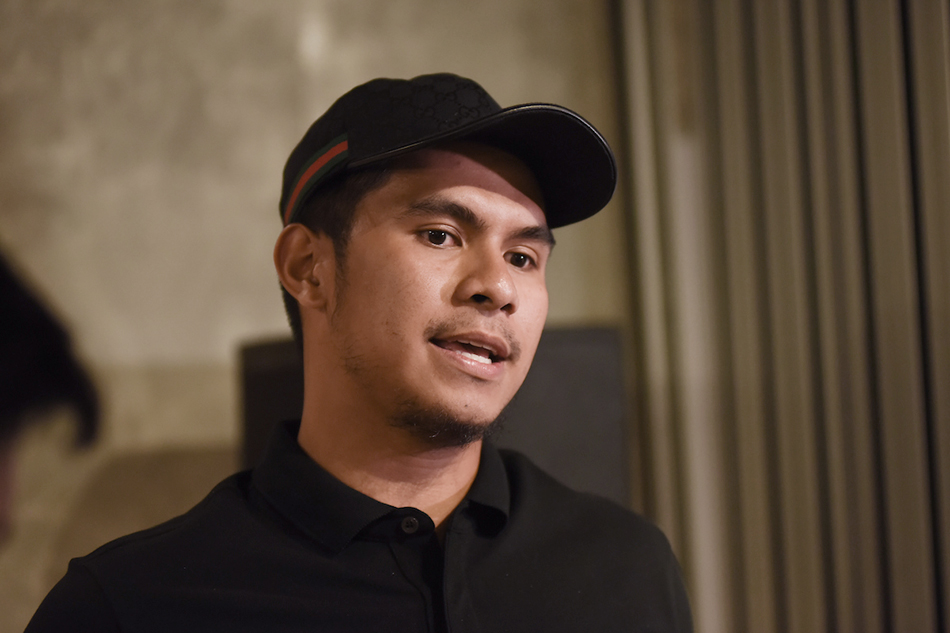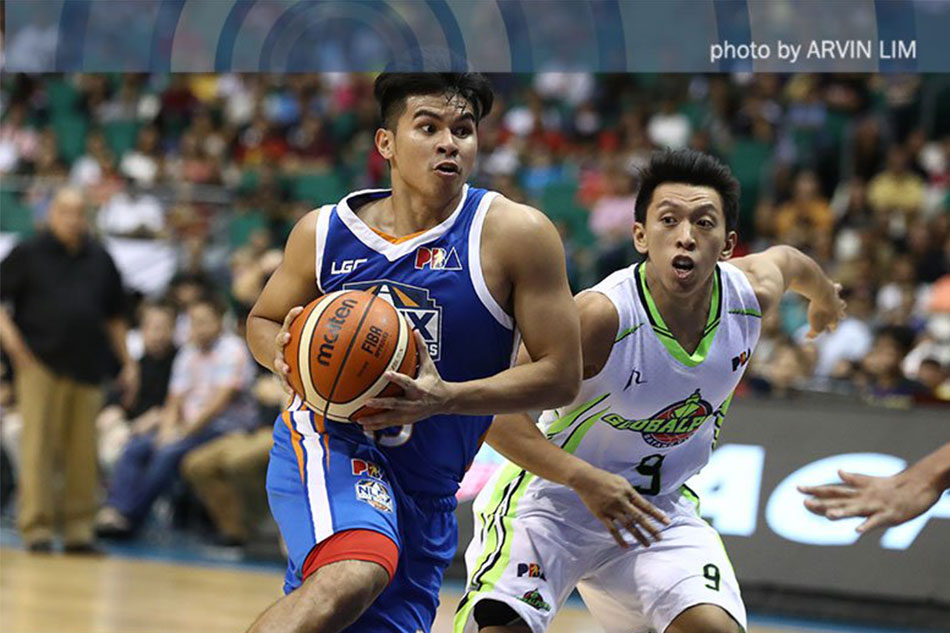What exactly are the 3 banned substances that got Kiefer suspended by FIBA | ABS-CBN
ADVERTISEMENT

Welcome, Kapamilya! We use cookies to improve your browsing experience. Continuing to use this site means you agree to our use of cookies. Tell me more!
What exactly are the 3 banned substances that got Kiefer suspended by FIBA
What exactly are the 3 banned substances that got Kiefer suspended by FIBA
Camille B. Naredo,
ABS-CBN News
Published May 29, 2018 01:33 PM PHT
MANILA, Philippines – The basketball-mad Philippines was rattled on Monday when it was confirmed that one of its brightest young stars, Kiefer Ravena, has been suspended by FIBA for 18 months for a failed drug test.
MANILA, Philippines – The basketball-mad Philippines was rattled on Monday when it was confirmed that one of its brightest young stars, Kiefer Ravena, has been suspended by FIBA for 18 months for a failed drug test.
Ravena tested positive for three banned substances following Gilas Pilipinas' game against Japan at the Mall of Asia Arena last February 25, and will not be allowed to play until August 24 of next year.
Ravena tested positive for three banned substances following Gilas Pilipinas' game against Japan at the Mall of Asia Arena last February 25, and will not be allowed to play until August 24 of next year.
The NLEX rookie and stakeholders of Philippine basketball made it clear that Ravena took no illegal drugs, but instead ingested a pre-workout drink – called "DUST" – that had ingredients featured on the Prohibited List of the World Anti-Doping Agency (WADA).
The NLEX rookie and stakeholders of Philippine basketball made it clear that Ravena took no illegal drugs, but instead ingested a pre-workout drink – called "DUST" – that had ingredients featured on the Prohibited List of the World Anti-Doping Agency (WADA).
It was an "honest mistake" by Ravena, who did not indicate on his Doping Control Form that he had drank a supplement ahead of their game. The player also expressed regret at not taking time to research about the drink, especially as it was his first time to use it after running out of his usual pre-workout aid.
It was an "honest mistake" by Ravena, who did not indicate on his Doping Control Form that he had drank a supplement ahead of their game. The player also expressed regret at not taking time to research about the drink, especially as it was his first time to use it after running out of his usual pre-workout aid.
ADVERTISEMENT
Officials of the Samahang Basketbol ng Pilipinas (SBP) noted Monday that it was difficult for Ravena to know he was using a dangerous product. After all, there is little education among Filipino athletes regarding doping, or WADA.
Officials of the Samahang Basketbol ng Pilipinas (SBP) noted Monday that it was difficult for Ravena to know he was using a dangerous product. After all, there is little education among Filipino athletes regarding doping, or WADA.
"The way they describe drugs are by their chemical names," said SBP chairman emeritus Manny V. Pangilinan. "You have to be an expert to determine that the ingredients in a particular drink is a banned substance by WADA."
"The way they describe drugs are by their chemical names," said SBP chairman emeritus Manny V. Pangilinan. "You have to be an expert to determine that the ingredients in a particular drink is a banned substance by WADA."
"The three names that were mentioned do not come readily apparent to any athlete," he added.
"The three names that were mentioned do not come readily apparent to any athlete," he added.
So what were the three ingredients that Ravena tested positive for?
So what were the three ingredients that Ravena tested positive for?
A document released by FIBA revealed that Ravena's urine sample from their game against Japan were positive for 4-methylhexan-2-amine (methylhexaneamine) and 1,3-dimethylbutylamine (DMBA), which are "specified substances prohibited in-competition under S.6 of the 2018 WADA List of Prohibited Substances and Methods."
A document released by FIBA revealed that Ravena's urine sample from their game against Japan were positive for 4-methylhexan-2-amine (methylhexaneamine) and 1,3-dimethylbutylamine (DMBA), which are "specified substances prohibited in-competition under S.6 of the 2018 WADA List of Prohibited Substances and Methods."
ADVERTISEMENT
He also tested positive for higenamine, which is prohibited in-competition under S.3 of the 2018 Prohibited List.
He also tested positive for higenamine, which is prohibited in-competition under S.3 of the 2018 Prohibited List.
Methylhexaneamine
The United States Anti-Doping Agency (USADA) issued a warning against methylhexaneamine as far back as June 2011, noting that it could "cause a positive test." It is known by several other names, including Geranamine, geranium oil, and DMAA (1,3-dimethylamylamine).
The United States Anti-Doping Agency (USADA) issued a warning against methylhexaneamine as far back as June 2011, noting that it could "cause a positive test." It is known by several other names, including Geranamine, geranium oil, and DMAA (1,3-dimethylamylamine).
According to the US Food and Drug Administration (FDA), methylhexaneamine "is an ingredient found illegally in some dietary supplements and often touted as a 'natural' stimulant." It will supposedly cause weight loss, muscle building, and performance enhancement, but has been found to pose considerable health risks.
According to the US Food and Drug Administration (FDA), methylhexaneamine "is an ingredient found illegally in some dietary supplements and often touted as a 'natural' stimulant." It will supposedly cause weight loss, muscle building, and performance enhancement, but has been found to pose considerable health risks.
As far back as July 2013, the FDA warned that the compound "can elevate blood pressure and lead to cardiovascular problems, ranging from shortness of breath and tightening in the chest to heart attack." There have been at least five deaths linked to the use of products containing the compound, the New York Times reported in 2013.
As far back as July 2013, the FDA warned that the compound "can elevate blood pressure and lead to cardiovascular problems, ranging from shortness of breath and tightening in the chest to heart attack." There have been at least five deaths linked to the use of products containing the compound, the New York Times reported in 2013.
DMBA
The UK Anti-Doping Agency issued a warning against 1,3-dimethylbutylamine (DMBA) in April 2015, noting that it has been found in several supplement products.
The UK Anti-Doping Agency issued a warning against 1,3-dimethylbutylamine (DMBA) in April 2015, noting that it has been found in several supplement products.
ADVERTISEMENT
The compound was found in stimulants that "are marketed to increase weight loss, enhance brain function, or to be used as a pre-workout supplement."
The compound was found in stimulants that "are marketed to increase weight loss, enhance brain function, or to be used as a pre-workout supplement."
According to the UKAD, DMBA "has a similar structure to the prohibited and potentially dangerous methylhexaneamine and appears to be a replacement for methylhexaneamine in supplement formulations."
According to the UKAD, DMBA "has a similar structure to the prohibited and potentially dangerous methylhexaneamine and appears to be a replacement for methylhexaneamine in supplement formulations."
"Athletes should avoid all products that contain this substance as its use could be detrimental to health and lead to an Anti-Doping Rule Violation (ADRV) following an In-Competition test. The safety of DMBA is also unknown since the stimulant has never been studied in humans," the UKAD said at the time.
"Athletes should avoid all products that contain this substance as its use could be detrimental to health and lead to an Anti-Doping Rule Violation (ADRV) following an In-Competition test. The safety of DMBA is also unknown since the stimulant has never been studied in humans," the UKAD said at the time.
In 2015, the FDA issued warnings to 14 sports supplement companies whose products contained DMBA. One of those companies was Blackstone Labs LLC, which produces "DUST" – the pre-workout aid that Ravena used.
In 2015, the FDA issued warnings to 14 sports supplement companies whose products contained DMBA. One of those companies was Blackstone Labs LLC, which produces "DUST" – the pre-workout aid that Ravena used.
Higenamine
While both methylhexaeamine and DMBA are identified as "specified stimulants" that are banned under S6 of the 2018 Prohibited List, higenamine is listed in a different section. It is banned as a "beta-2 agonists" and is found in several fruits and plants.
While both methylhexaeamine and DMBA are identified as "specified stimulants" that are banned under S6 of the 2018 Prohibited List, higenamine is listed in a different section. It is banned as a "beta-2 agonists" and is found in several fruits and plants.
ADVERTISEMENT
According to the Australian Sports Anti-Doping Authority, beta-2 agonists are substances that allow lungs to take in more oxygen. These are substances that are prohibited by WADA at all times, and not just during competition periods.
According to the Australian Sports Anti-Doping Authority, beta-2 agonists are substances that allow lungs to take in more oxygen. These are substances that are prohibited by WADA at all times, and not just during competition periods.
According to USADA, higenamine is being used as a substitute for DMAA. "Research indicates that higenamine has mixed adrenergic receptor activity, meaning it may act as a general stimulant," it added.
According to USADA, higenamine is being used as a substitute for DMAA. "Research indicates that higenamine has mixed adrenergic receptor activity, meaning it may act as a general stimulant," it added.
"In some circumstances, higenamine may also alter blood pressure and cause irregular heartbeats," said USADA.
"In some circumstances, higenamine may also alter blood pressure and cause irregular heartbeats," said USADA.
'DUST'
FIBA said on Monday that Ravena admitted his negligence in the situation, as they noted that the energy drink indicated that both higenamine and DMAA were included in their product.
FIBA said on Monday that Ravena admitted his negligence in the situation, as they noted that the energy drink indicated that both higenamine and DMAA were included in their product.
"Although not on the label, the panel reasonably concludes that DUST is also the source of DMBA, given DMBA's prevalence in supplements and its chemical proximity to methylhexanamine," FIBA said.
"Although not on the label, the panel reasonably concludes that DUST is also the source of DMBA, given DMBA's prevalence in supplements and its chemical proximity to methylhexanamine," FIBA said.
ADVERTISEMENT
Ravena could have been suspended by FIBA for a full two years for his violation, but instead his sanction was downgraded to 18 months for several reasons.
Ravena could have been suspended by FIBA for a full two years for his violation, but instead his sanction was downgraded to 18 months for several reasons.
FIBA found that Ravena did not disregard his anti-doping duties, but was simply "not well equipped to make the right, informed decision." After all, Ravena was acting upon the advice of a store clerk, who told him that "DUST" was very similar to the product he usually uses, "C4." Ravena has had no issues when ingesting C4, a pre-workout supplement that he discovered during his time in the United States.
FIBA found that Ravena did not disregard his anti-doping duties, but was simply "not well equipped to make the right, informed decision." After all, Ravena was acting upon the advice of a store clerk, who told him that "DUST" was very similar to the product he usually uses, "C4." Ravena has had no issues when ingesting C4, a pre-workout supplement that he discovered during his time in the United States.
FIBA said that Ravena's "erroneous assumption results from his lack of anti-doping education, which in no way exonerates him, but … contributes directly to the risk wrongly perceived by the player when using DUST."
FIBA said that Ravena's "erroneous assumption results from his lack of anti-doping education, which in no way exonerates him, but … contributes directly to the risk wrongly perceived by the player when using DUST."
"This is wake-up call for all of us," SBP president Al Panlilio said of Ravena's situation. "We have to be aware of what we're putting in our bodies."
"This is wake-up call for all of us," SBP president Al Panlilio said of Ravena's situation. "We have to be aware of what we're putting in our bodies."
The next step for SBP, as well as the Philippine Sports Commission and Philippine Olympic Committee, is to embark on an awareness campaign to educate Filipino athletes about doping.
The next step for SBP, as well as the Philippine Sports Commission and Philippine Olympic Committee, is to embark on an awareness campaign to educate Filipino athletes about doping.
ADVERTISEMENT
"Ignorance is not an excuse," Panlilio said. "That's why we will embark on a campaign of awareness and education."
"Ignorance is not an excuse," Panlilio said. "That's why we will embark on a campaign of awareness and education."
For more sports coverage, visit the ABS-CBN Sports website.
For more sports coverage, visit the ABS-CBN Sports website.
ADVERTISEMENT
ADVERTISEMENT





